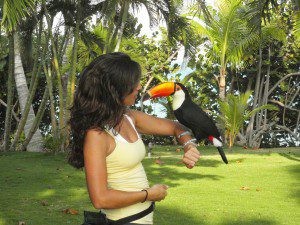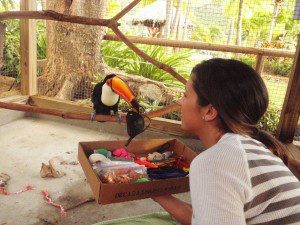Are you wondering, “Can You Keep A Toucan As A Pet?” PETS.EDU.VN is here to guide you through everything you need to know about toucan ownership, from daily care and costs to space requirements and potential challenges. We’ll help you determine if these captivating birds are the right fit for your lifestyle, covering topics such as exotic bird care, avian companionship, and tropical bird ownership.
1. Understanding the Allure of Toucans as Pets
Toucans, with their vibrant colors and playful personalities, are undeniably captivating. Their large, colorful bills and unique appearance make them a sought-after exotic pet. However, before you give in to their charm, it’s essential to delve into the realities of toucan ownership. Understanding the commitment, care, and specific needs of these birds is the first step in responsible pet ownership.
1.1. What Makes Toucans Appealing?
Toucans possess several qualities that make them attractive to potential owners:
- Striking Appearance: Their brightly colored bills and plumage make them visually stunning.
- Playful Personalities: Toucans are known for their curious and energetic nature.
- Intelligence: They are intelligent birds capable of learning tricks and interacting with their environment.
- Unique Pet: Owning a toucan sets you apart as someone who appreciates the extraordinary.
1.2. The Growing Interest in Exotic Pets
The exotic pet trade has seen a rise in recent years, with more people seeking unique animal companions. While toucans may seem like an exciting choice, it’s crucial to understand that they are not domesticated animals. Their care requirements are complex, and meeting their needs in a captive environment can be challenging.
2. The Realities of Toucan Ownership
While the idea of owning a toucan may seem glamorous, it’s essential to be aware of the day-to-day realities. Toucan ownership is not for the faint of heart and requires a significant commitment of time, resources, and effort.
2.1. Time Commitment
Toucans demand a significant time investment. They need daily interaction, specialized feeding, and meticulous cleaning. If you have a busy lifestyle or work long hours, you may find it difficult to meet their needs.
2.1.1. Daily Interaction
Toucans are social creatures that require daily interaction to thrive. They need playtime, training, and attention to prevent boredom and behavioral issues. Neglecting their social needs can lead to depression and destructive behaviors.
2.1.2. Specialized Feeding
Toucans have a unique dietary requirement for low-iron diets. They need fresh fruit twice a day, which needs to be chopped every morning.
2.1.3. Meticulous Cleaning
Toucans have rapid metabolisms and require cleaning every day.
2.2. Financial Implications
Toucans are expensive pets. The initial purchase price can range from $8,000 to $20,000, and ongoing costs can be substantial.
2.2.1. Upfront Costs
The initial cost of acquiring a toucan can be prohibitive for many people. Expect to pay a significant sum for the bird itself, as well as for a suitable enclosure.
2.2.2. Ongoing Expenses
The ongoing expenses of toucan ownership can quickly add up. These include:
- Specialized food: Toucans require a diet of fresh fruit, insects, and low-iron pellets.
- Veterinary care: Exotic bird vets can be difficult to find and expensive.
- Enrichment: Toucans need a variety of toys and activities to keep them stimulated.
- Housing: Their large enclosures take a lot of space and are difficult to move.
2.3. Space Requirements
Toucans need a large enclosure to fly and exercise. A small cage is not sufficient for these active birds. If you don’t have enough space, you’ll need to reconsider.
2.3.1. Indoor vs. Outdoor Housing
Depending on your climate, you may need to house your toucan indoors or outdoors. Outdoor aviaries provide more space, but they need to be secure and weather-proof. Indoor enclosures need to be large enough for the bird to fly short distances.
2.3.2. Cage Size
The minimum cage size for a toucan is generally considered to be 8 feet long, 4 feet wide, and 6 feet tall. However, larger is always better. The cage should be equipped with multiple perches, toys, and feeding stations.
2.4. Mess and Hygiene
Toucans are messy eaters and produce a significant amount of waste. Be prepared for daily clean-up. If you are not ready to deal with these messes, you may want to look into other pets.
2.4.1. Dietary Habits
Toucans have a habit of flinging their food around while eating. This can create a mess around their enclosure. Regular cleaning is essential to maintain good hygiene.
2.4.2. Waste Production
Toucans have a rapid metabolism, which means they produce waste frequently. Their droppings can be watery and messy. Daily cleaning is necessary to prevent the build-up of bacteria and odors.
2.5. Training Challenges
Toucans are not as easily trained as some other bird species. They have a short attention span and can be difficult to motivate. If you’re hoping to train your toucan, be prepared for patience and persistence.
2.5.1. Short Attention Span
Toucans have a limited attention span, making it difficult to train them for extended periods. Short, frequent training sessions are more effective.
2.5.2. Motivation
Finding the right motivator for your toucan can be challenging. They may not be as interested in treats or praise as other animals. Experiment with different rewards to find what works best.
2.6. Undomesticated Nature
Toucans are wild animals and retain many of their natural instincts. They may not behave like domesticated pets. Be prepared for behaviors that seem unpredictable or even undesirable.
2.6.1. Instinctual Behaviors
Toucans may exhibit behaviors that are natural to them but undesirable in a domestic setting. These can include biting, screaming, and territorial displays.
2.6.2. Adaptability
Toucans are not well-suited to living in a human environment. They may struggle to adapt to confinement and may experience stress and anxiety.
2.7. Finding Care in Your Absence
Finding someone willing and able to care for your toucan while you’re away can be difficult. Many people are intimidated by exotic birds or lack the necessary experience. If you travel frequently, toucan ownership may not be practical for you.
2.7.1. Limited Availability
Few people have the knowledge and experience to care for toucans properly. Finding a qualified pet sitter or boarding facility can be challenging.
2.7.2. Trust and Reliability
Entrusting your toucan to someone else requires a high level of trust and reliability. You need to be confident that the person caring for your bird will follow your instructions and provide the necessary care.
2.8. Social Acceptance
Not everyone will understand your decision to own a toucan. Be prepared for questions, skepticism, and even criticism from friends and family.
2.8.1. Misconceptions
Many people have misconceptions about toucans and exotic birds in general. They may not understand the commitment and care required.
2.8.2. Lifestyle Adjustments
Owning a toucan may require you to make adjustments to your lifestyle. You may need to limit your travel or social activities to ensure your bird’s needs are met.
2.9. Emotional Toll
Caring for a toucan can be emotionally challenging. You may experience feelings of guilt, worry, and frustration. It’s important to be prepared for these emotions and have a support system in place.
2.9.1. Guilt
You may feel guilty about keeping a wild animal in captivity. It’s important to acknowledge these feelings and focus on providing the best possible life for your toucan.
2.9.2. Worry
Toucans are prone to certain health problems, such as iron storage disease. You may worry about your bird’s health and well-being. Regular veterinary check-ups and a proactive approach to care can help alleviate these concerns.
2.10. Long-Term Commitment
Toucans can live for 20 years or more. Be prepared to care for your toucan for the long haul. If you’re not willing to make this commitment, toucan ownership is not for you.
2.10.1. Life Changes
Over the course of 20 years, your life will likely change in many ways. You may move, change jobs, or start a family. It’s important to consider how these changes will impact your ability to care for your toucan.
2.10.2. Responsibility
Owning a toucan is a significant responsibility. You are responsible for providing food, shelter, medical care, and enrichment for your bird for the rest of its life.
3. Understanding Toucan Behavior and Needs
To provide proper care for a toucan, it’s essential to understand their natural behaviors and specific needs. This knowledge will help you create a stimulating and enriching environment that promotes their physical and psychological well-being.
3.1. Natural Habitat and Social Structure
Toucans are native to the tropical rainforests of Central and South America. They typically live in small flocks and forage for food in the canopy. Understanding their natural habitat and social structure can provide insights into their behavior in captivity.
3.2. Dietary Requirements
Toucans have a unique dietary requirement for low-iron diets. They need fresh fruit twice a day, which needs to be chopped every morning.
3.2.1. Fruit Consumption
In the wild, toucans primarily eat fruit. They use their large bills to reach fruits that other birds cannot access. In captivity, they should be provided with a variety of fresh fruits, such as papaya, mango, berries, and grapes.
3.2.2. Low-Iron Diet
Toucans are susceptible to iron storage disease (hemochromatosis), which can be fatal. It’s important to feed them a low-iron diet to prevent this condition. Avoid foods that are high in iron, such as citrus fruits, tomatoes, and leafy green vegetables. Instead, focus on fruits with low iron content, such as papaya, mango, and melon. Specially formulated low-iron pellets are also available.
3.3. Environmental Enrichment
Toucans are active and intelligent birds that need a stimulating environment to prevent boredom and behavioral problems.
3.3.1. Perches and Climbing Structures
Provide a variety of perches of different sizes and textures to exercise their feet and legs. Climbing structures, such as ropes and ladders, can also provide enrichment.
3.3.2. Toys and Activities
Toucans need a variety of toys to keep them entertained. These can include puzzle toys, foraging toys, and destructible toys. Rotate the toys regularly to keep them interested.
3.4. Social Interaction
Toucans are social animals and need interaction with their owners or other birds. If you only have one toucan, make sure to spend plenty of time with it each day.
3.4.1. Bonding
Toucans can form strong bonds with their owners. Spend time talking to your toucan, playing with it, and offering it treats.
3.4.2. Vocalization
Toucans communicate through a variety of vocalizations, including barks, croaks, and rattles. Pay attention to your toucan’s vocalizations to understand its mood and needs.
3.5. Health Considerations
Toucans are prone to certain health problems, such as iron storage disease, fungal infections, and respiratory problems. Regular veterinary check-ups are essential to detect and treat these conditions early.
3.5.1. Iron Storage Disease (Hemochromatosis)
As mentioned earlier, iron storage disease is a common and potentially fatal condition in toucans. It’s important to monitor your toucan’s iron levels and adjust its diet accordingly.
3.5.2. Fungal Infections
Toucans are susceptible to fungal infections, such as aspergillosis. These infections can affect the respiratory system and other organs. Maintaining a clean environment and providing a healthy diet can help prevent fungal infections.
3.5.3. Respiratory Problems
Toucans are sensitive to air quality. Avoid exposing them to smoke, dust, and other irritants. Ensure that their enclosure is well-ventilated.
4. Alternatives to Toucan Ownership
If, after considering the challenges of toucan ownership, you decide that it’s not the right fit for you, there are other options for enjoying these fascinating birds.
4.1. Bird Sanctuaries and Zoos
Visiting a bird sanctuary or zoo is a great way to observe toucans in a safe and enriching environment. You can learn about their natural behaviors and conservation status without the responsibility of ownership.
4.2. Virtual Toucan Experiences
With technology, you can experience toucans through documentaries, live webcams, and virtual reality experiences. These options allow you to appreciate toucans without the commitment and challenges of ownership.
4.3. Consider Other Bird Species
If you’re drawn to the idea of owning a bird, consider other species that are more domesticated and easier to care for. Parrots, finches, and canaries can make wonderful companions for the right owner.
5. Making an Informed Decision
Deciding whether or not to own a toucan is a big decision that should not be taken lightly. Take the time to research, consider your lifestyle, and weigh the pros and cons before making a commitment.
5.1. Researching Toucan Species
There are several species of toucans, each with its own unique characteristics and care requirements. Research the different species to determine which one is the best fit for you.
5.2. Evaluating Your Lifestyle
Consider your lifestyle and whether you can realistically meet the needs of a toucan. Do you have enough time, money, and space? Are you willing to make the necessary sacrifices?
5.3. Consulting with Experts
Talk to experienced toucan owners, avian veterinarians, and bird sanctuary staff to get their insights and advice. They can provide valuable information and help you make an informed decision.
6. Ensuring Ethical Acquisition
If you decide to acquire a toucan, it’s important to do so ethically. Avoid purchasing birds from breeders who engage in unethical practices.
6.1. Reputable Breeders
Look for breeders who prioritize the health and well-being of their birds. Ask about their breeding practices, health testing protocols, and socialization methods.
6.2. Adoption
Consider adopting a toucan from a rescue organization or bird sanctuary. This can give a deserving bird a second chance at a good life.
6.3. Legal Considerations
Check your local laws and regulations regarding toucan ownership. Some areas may have restrictions or require permits.
7. Preparing for Toucan Arrival
If you decide to bring a toucan into your life, it’s important to prepare your home and family for its arrival.
7.1. Setting Up the Enclosure
Set up the toucan’s enclosure before it arrives. Make sure it is spacious, secure, and equipped with all the necessary perches, toys, and feeding stations.
7.2. Introducing the Toucan to Your Home
Introduce the toucan to your home gradually. Allow it to explore its new surroundings at its own pace.
7.3. Establishing a Routine
Establish a daily routine for feeding, cleaning, and interaction. This will help the toucan feel secure and comfortable in its new home.
8. Optimizing Toucan Care with the Latest Innovations
Stay up-to-date with the latest advancements in toucan care to ensure your feathered friend receives the best possible treatment.
8.1. Advanced Nutritional Formulations
| Nutrient | Benefit | Example |
|---|---|---|
| Low-Iron Pellets | Prevents iron storage disease, a common issue in toucans. | Mazuri Low Iron Softbill Diet |
| Probiotics | Supports gut health, improving digestion and nutrient absorption. | Bene-Bac Bird Probiotic Powder |
| Omega-3 Fatty Acids | Enhances feather quality and supports cardiovascular health. | Flaxseed oil supplement |
| Vitamin D3 | Essential for calcium absorption, promoting strong bones and overall health. | Rep-Cal Calcium with D3 Supplement |
| Antioxidants (Vitamin E, C) | Boosts the immune system and protects against cellular damage. | Mixed berry diet, supplemented with a high-quality avian multivitamin. |




8.2. Cutting-Edge Veterinary Treatments
| Treatment | Benefit | Availability |
|---|---|---|
| Minimally Invasive Surgery | Reduces recovery time and minimizes stress for the bird. | Specialized avian veterinary clinics |
| Advanced Imaging (MRI, CT Scan) | Provides detailed diagnostics for accurate health assessments. | Veterinary referral hospitals |
| Targeted Iron Chelation Therapy | Effectively manages iron storage disease with fewer side effects. | Veterinary specialists in avian medicine |
| Laser Therapy | Accelerates wound healing and reduces inflammation. | Veterinary clinics with advanced rehabilitation services |
| Gene Therapy | Emerging research shows potential for correcting genetic predispositions. | Research institutions and universities |
8.3. Innovative Enrichment Tools
| Tool/Activity | Benefit | Implementation |
|---|---|---|
| Interactive Foraging Toys | Stimulates natural foraging behaviors, preventing boredom and obesity. | Hide treats in puzzle toys that require the toucan to solve for access. |
| Smart Bird Feeders | Dispenses food at intervals, mimicking natural feeding patterns. | Programmable feeders that can be set to dispense small amounts of food throughout the day. |
| Automated Misting Systems | Maintains optimal humidity levels, supporting respiratory health. | Adjustable misting systems to simulate rainforest conditions. |
| UV Lighting | Provides essential UVB and UVA light, promoting vitamin D synthesis and mental well-being. | Full-spectrum avian lights on timers to mimic natural daylight cycles. |
| Environmental Sound Systems | Mimics natural rainforest sounds, reducing stress and promoting relaxation. | Sound systems playing recordings of rainforest ambiance during the day. |
9. Navigating Legal and Ethical Considerations
Before acquiring a toucan, it’s crucial to understand the legal landscape and ethical implications of owning such an exotic animal.
9.1. Understanding Legal Regulations
| Region/Country | Regulations | Implications |
|---|---|---|
| United States | Varies by state; some states require permits, others prohibit exotic pet ownership. | Check local and state laws to ensure legal compliance; penalties for non-compliance can include fines and confiscation of the animal. |
| Europe | EU Wildlife Trade Regulations; CITES permits required for certain species. | Strict documentation and inspections may be necessary; ensure the toucan is legally imported and traded. |
| Canada | Provincial regulations vary; some provinces prohibit or restrict exotic pet ownership. | Research provincial laws to verify legality; permits and inspections may be required. |
| Australia | Strict biosecurity laws; importing toucans is generally prohibited. | Toucan ownership is highly restricted; severe penalties for illegal importation. |
9.2. Promoting Ethical Sourcing
| Practice | Benefit | Implementation |
|---|---|---|
| Support Reputable Breeders | Ensures humane treatment and genetic diversity, reducing health issues. | Verify breeder’s certifications, conduct site visits, and check reviews. |
| Advocate for Conservation | Helps protect wild populations and habitats, ensuring long-term survival of the species. | Donate to conservation organizations, participate in advocacy campaigns, and educate others about toucan conservation. |
| Avoid Wild-Caught Birds | Reduces the impact on wild populations and promotes ethical animal handling. | Refuse to purchase toucans from unknown or suspicious sources; inquire about the bird’s origin and breeding history. |
| Support Rescue and Rehabilitation Programs | Provides a second chance for toucans in need, reducing demand for new birds. | Adopt toucans from reputable rescue organizations; volunteer time and resources to support their efforts. |
10. Frequently Asked Questions (FAQ) About Toucan Ownership
Here are some frequently asked questions about keeping a toucan as a pet:
- What is the average lifespan of a toucan? Toucans typically live for 20-25 years in captivity.
- What do toucans eat? Toucans eat a diet of fresh fruit, insects, and low-iron pellets.
- How much does it cost to own a toucan? The initial cost can range from $8,000 to $20,000, and ongoing costs can be substantial.
- Do toucans make good pets for children? Toucans are not generally recommended as pets for children due to their complex care requirements and potential for biting.
- Are toucans noisy? Toucans can be quite vocal, with a variety of barks, croaks, and rattles.
- Do toucans need a lot of attention? Yes, toucans are social animals that require daily interaction and attention.
- Can toucans be trained? Toucans can be trained, but they have a short attention span and can be difficult to motivate.
- What is iron storage disease? Iron storage disease (hemochromatosis) is a common and potentially fatal condition in toucans caused by the build-up of iron in the liver.
- How do I find an avian veterinarian? Ask your local bird club or bird sanctuary for recommendations.
- Are toucans legal to own in my state? Check your local laws and regulations regarding toucan ownership. Some areas may have restrictions or require permits.
If you’re passionate about exotic birds and seek to deepen your understanding, PETS.EDU.VN offers comprehensive resources and expert guidance. From detailed species profiles to advice on nutrition and healthcare, we’re here to support you.
For personalized advice and further information, contact us at 789 Paw Lane, Petville, CA 91234, United States. You can also reach us via Whatsapp at +1 555-987-6543 or visit our website at pets.edu.vn.
